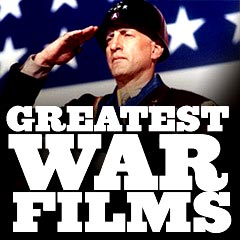
|
Greatest War Movies 1970s |
| Film Title/Year/Director, War-time Setting and Brief Description | ||
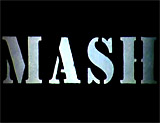
|
M*A*S*H (1970)
Iconoclastic Robert Altman's anti-Korean war, off-beat dark-comedy was an outrageous satirization about a group of surgeons and nurses stationed at a Mobile Army Surgical Hospital (MASH) along the Korean 38th parallel. Although the film was set in Korea, its real focus of attention was the frustrating Vietnam conflict. The countercultural, black comedy anti-war film was a thinly disguised allegory for the unpopular Vietnam War that was raging at the time, and a critique of war in general. The army surgeons retained their sanity by joking, anti-authoritarian and anti-bureaucratic sentiment, and pranks. The film's most memorable scenes included the humiliation of Major Frank Burns (Robert Duvall) and "Hot Lips" Houlihan (Sally Kellerman) (when their love-making was broadcast to the entire camp, and she deservedly earned the nickname 'Hot Lips'). Other great sequences included the Last Supper scene to say farewell to "Painless Pole" Walt Waldowski (John Schuck) who was going to commit suicide (with its ballad 'Suicide is Painless'), and the climactic football game. Only Burghoff of the superb cast (Elliott Gould, Donald Sutherland, Oscar-nominated Sally Kellerman, Robert Duvall and Gary Burghoff) went on to reprise his role as Radar in the popular, long-running TV series. |
  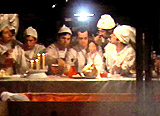
|
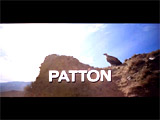
|
Patton
(1970)
Franklin J. Schaffner's complex epic biopic, another war-related Best Picture winner, starred Oscar-winning actor George C. Scott (who refused the award) as the legendary, heroically-crazed, and controversial "Old Blood and Guts" military genius and title character, and Karl Malden as the balanced Gen. Omar Bradley. It was a fairly accurate film biography of the controversial, bombastic, multi-dimensional World War II general and hero George S. Patton. The larger-than-life, flamboyant, maverick, pugnacious military figure was well-known for his fierce love of America, his temperamental battlefield commanding, his arrogant power-lust ("I love it. God help me, I do love it so. I love it more than my life"), his poetry writing, his slapping of a battle-fatigued soldier, his anti-diplomatic criticism of the Soviet Union, and his firing of pistols at fighter planes. |

|

|
Tora! Tora! Tora! (1970)
This lengthy (and sometimes tedious and dull) Japanese-American co-produced, documentary-styled disaster-war film, a major blockbuster, was about the Pearl Harbor attack told from the perspective of both sides. Its unique points-of-view were obtained by having separate film crews shoot scenes for each country, and then editing them together. The film portrayed the blunders on both sides. Without the use of computer-graphics, all of the technical special effects had to be staged with models or in reality. The war film was historically accurate, credible and even-handed, dispensing with a love story or other distracting elements (although too dialogue-heavy), and the Japanese characters spoke their native language (with subtitles). It assembled a talented collection of older (and mostly unrecognizable) character actors, but the main stars included Admiral Husband E. Kimmel (Martin Balsam), Lt. General Walter C. Short (Jason Robards), Colonel Rufus S. Bratton (E.G. Marshall), Admiral William F. Halsey (James Whitmore), Japanese Admiral Isoroku Yamamoto (Soh Yamamura), and Lt. Commander Mitsuo Fuchida (Takahiro Tamura). |
    
|

|
Ulzana's Raid (1972)
Robert Aldrich's grim and bloody western film was interpreted as an allegory about the US experience in Vietnam. It starred Burt Lancaster as grizzled, unorthodox, world-weary US Army scout McIntosh. He was in pursuit of fugitive and renegade Apache leader Ulzana or Josana (Joaquin Martinez) with compassionate, idealistic and naive West Point Lieutenant Garnett DeBuin (Bruce Davison). The film's tagline: "One man alone understood the savagery of the early American West from both sides" described how DeBuin learned how to adopt McIntosh's realistic and hardened attitude toward the 'noble savage' and toward the veteran soldiers alike. |

|

|
The Man Who Would
Be King (1975, UK)
An old-fashioned, rousing costume adventure film and morality tale told in flashback from writer/director John Huston and based on Anglo-Indian novelist Rudyard Kipling's (Christopher Plummer) short story tale. Shot on location in Morocco, it was about two roguish British soldiers-adventurers, Peachy Carnehan (Michael Caine) and Daniel Dravot (Sean Connery) at the turn of the century who set out from Raj-ruled India. While serving as military officers in the remote city of Kafiristan in E. Afghanistan (a province now called Nuristan), the pair were mistaken for gods or kings by the people in the priest cult. During battle, Danny was struck by an arrow, but was unharmed (his bandolier, leather ammunition belt, under his clothing stopped the arrow). The natives believed Daniel was impervious to death, and a direct descendant of Alexander the Great. He himself began to arrogantly believe in his own divinity, and his right to take their rich royal treasures from the holy city of Sikandergul, with deadly consequences. He was disappointingly revealed to be human when beautiful marriage prospect and bride-to-be Roxanne (Shakira Caine), bit him on the cheek when he kissed her, in the ritualistic ceremony. Danny cried out: "The slut bit me." ("He's not god, not devil, but man"). Peachy realized the dire result: "The jig's up." The two were pursued by an angry Kafiristan mob. Wearing his crown, Dravot was cornered, trapped and forced to walk on a rope bridge high above a canyon's gorge. The support ropes were hacked away, and he suffered a spectacular death. Peachy was crucified between two pine trees, but survived the ordeal and was cut down the next day. Daniel's decayed head was brought back (still crowned) by his surviving partner Carnehan to be viewed by Narrator/Rudyard Kipling (Christopher Plummer). |
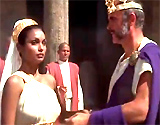 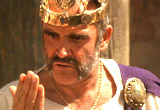  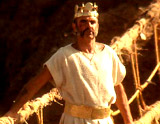
|

|
Midway (1976)
Jack Smight's war film was a fairly faithful recreation, told through a series of vignettes and episodes, of the surprising, courageous American victory over the Japanese fleet in 1942 at Midway, the turning point of the war. Its stellar cast was composed of big-name actors including Charlton Heston as Capt. Matt Garth, Henry Fonda as Adm. Chester Nimitz, Glenn Ford as Adm. Raymond Spruance, and Robert Mitchum as Adm. Bull Halsey. Newsreel and documentary footage were combined with the dramatic action. |
  
|

|
A Bridge Too Far (1977, UK) Richard Attenborough's big-budget film with an all-star cast, adapted from Cornelius Ryan's 1974 epic best-selling book, told of a daring and failed attempt (dubbed Operation Market Garden) in a 1944 WWII mission by Allied forces and their paratroopers behind enemy lines in Holland to capture a series of bridges on the Lower Rhine. The action included the British 1st Airborne Division's courageous defense at Arnhem Bridge, and vicious house-to-house fighting in Arnhem. |

|

|
Cross of Iron (1977)
Peckinpah's war film (his sole work in this genre) was based upon the 1956 autobiographical novel The Willing Flesh, by German writer Willi Heinrich, using the backdrop of the Eastern Front conflict between Germany and Russia. The film was decidedly anti-war and against the cruel effects of war in its story of class conflict in the ranks. The central figure was a beleaguered and disillusioned German officer in the Wehrmacht regiment, platoon leader Sgt. Steiner (James Coburn), who was tired of the war and contemptuous of the cruel actions of his superior officers. The film concentrated on the conflict between Steiner and his newly-appointed, Prussian aristocratic, scheming commander Captain Hauptmann Stransky (Maximilian Schell), whose sole deluded aim was to obtain an Iron Cross medal. |

|

|
Soldier of Orange (1977,
Dutch) (aka Soldaat Van Oranje)
Verhoeven's expensive and well-received Belgian-Dutch film followed a group of Netherlands students during a time of Nazi occupation during WWII, showing their shifting and opposing allegiances in response to Germany's invasion, as well as the horrible fateful consequences of warfare. The film was a precursor of the director's own Black Book (2007). Rutger Hauer starred as Erik Lanshof, one of a number of young people who joined the Resistance movement, while his friend Alex (Derek de Lint) fought with the SS on the German side. In the film's most memorable and symbolic scene, Erik and Alex danced ballroom tango together at a Nazi beach party. While Erik eventually became an RAF pilot, Alex was killed by a hand grenade in Russia. |

|

|
Coming Home (1978)
This thought-provoking, triple-Oscar winning film, set in 1968, dramatized the difficulties of post-Vietnam war adjustment experienced within a romantic triangle of characters on the homefront. While her gung-ho Marine captain husband Bob Hyde (Bruce Dern) was away at war, housewife Sally (Jane Fonda after her controversial visit to Hanoi in 1972, and her being dubbed 'Hanoi Jane') volunteered at an understaffed San Diego VA Hospital. She became unfaithful and intimately involved with one of the paraplegic, wheelchair-bound patients named Luke Martin (Jon Voight). Their relationship set up inevitable conflict and issues upon her husband's return home. |
 
|
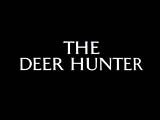
|
The Deer Hunter (1978)
This classic but controversially-compelling Vietnam film, Michael Cimino's Best Picture-winning war-related character study, told about three young patriotic steelworkers and fellow deer-hunters from a Pennsylvania small-town who found only horror and death in Vietnam's conflict. The trio were Robert De Niro as Michael Vronsky, Christopher Walken as Nick, and John Savage as Steven. The film was skewered for its depiction of fictional 'Russian Roulette' - although notable for the defining moment in which Michael turned the roulette pistol in his hand on his Viet Cong captors during an escape. The film ended with Steven legless, Michael disillusioned, and Nick still in Saigon playing lucrative yet suicidal Russian roulette - and dying in Michael's arms. |
  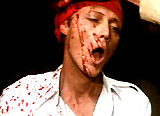
|
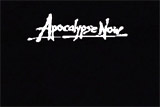
|
This harrowing epic vision of the madness of the war in Vietnam was an exceptionally spectacular war movie loosely based on Joseph Conrad's 1911 novel Heart of Darkness. Considered by many to be the best war movie of all time, with incredible performances, especially that of hawkish, gung-ho megalomaniac bad-ass Lt. Colonel Bill Kilgore (Robert Duvall) of the 1st Cavalry Division who "loves the smell of napalm in the morning," tossed playing cards on each dead enemy body to serve as calling cards, surfed ("Charlie don't surf!") and hosted steak BBQs amidst war. Sweeping, surreal, still-controversial Vietnam war epic. An American military assassin, a socially-dysfunctional loner named Captain Benjamin Willard (Martin Sheen), was commissioned to journey upriver on a patrol boat into Cambodia to 'terminate without prejudice' an insane, renegade, shaven Buddha-like, Special Forces colonel named Kurtz (Marlon Brando). The colonel had become an insane demi-god and now ran his own fiefdom in the jungle. The film ended with the ritualistic slaughter of Kurtz with a machete, brilliantly cross-cut with the brutal sacrificial killing of a carabao/water buffalo by the natives as a ritualistic sacrifice to their gods. |
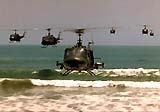  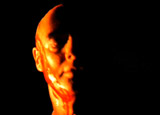 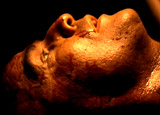
|

|
The Tin Drum
(1979, W. Germ.) (aka Die Blechtrommel)
Based on one half of Gunter Grass's highly acclaimed 1959 novel, this dark fairy-tale film about war's madness, a Best Foreign Language Film Academy Award winner, was perceived through the eyes of young Oskar Matzerath (David Bennent). Young Oskar was blessed with auditory clairvoyance, and lived in the "free city" of Danzig on the Polish-German border. At the age of 3, he received a tin drum for his birthday - and then after an accident, willed himself to not grow any further. He would pound on his drum and let go a piercing scream (powerful enough to shatter glass), both with greater frequency as Danzig was affected by war and Nazi occupation. |

|
(chronological by film title) Introduction | 1900s-1920s | 1930s | 1940s-1 | 1940s-2 | 1950s | 1960s-1 | 1960s-2 | 1970s | 1980s | 1990s | 2000s | 2010s |